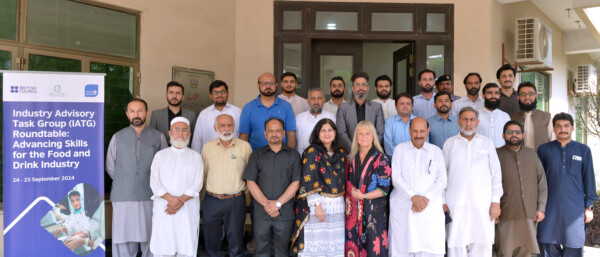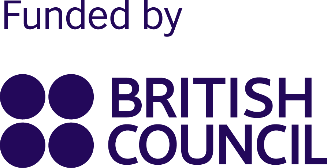
The importance of partnerships: Insights from the IATG initiative in Pakistan’s food and beverage sector
 Jane Rexworthy, Managing Director, People 1st International
Jane Rexworthy, Managing Director, People 1st International
Effective collaboration between the public and private sectors is essential for achieving sustainable development. Public-private partnerships (PPPs) serve as a crucial mechanism to align education, industry and government efforts, ensuring that workforce skills are both relevant and future-proof.
This was evident in the Industry Advisory Task Group (IATG) initiative funded by the British Council’s International Skills Partnership project, led by People 1st International, in collaboration with the Khyber Pakhtunkhwa Economic Zone Development and Management Company (KPEZDMC). Whilst the focus was on the food and beverage sector, the project established a PPP model with wide-ranging applicability across sectors in Pakistan.
Building strong stakeholder relationships
The backbone of the IATG initiative has been the active involvement of key stakeholders through consistent consultation, both virtually and in-person. Stakeholder meetings held in Pakistan in late 2024 brought together a diverse group including KPEZDMC, representatives from higher education, technical and vocational education and training (TVET) institutions, government agencies and critically, employers. These stakeholders recognised that the gaps in sector productivity were closely tied to skills shortages.
The meetings highlighted the need for enhanced collaboration, not just to fill skills gaps, but to create structured frameworks that ensure training programmes are developed in tandem with industry needs. This was further emphasised by aligning with existing government skills initiatives, such as those led by National Vocational and Technical Training Commission (NAVTTC) and Technical Education and Vocational Training Authority (TEVTA).
Aligning vision and actions through workshops
A significant milestone in the project was the introductory workshop held in November 2023. This workshop provided a platform for stakeholders to define the IATG’s vision and mission, agree on roles and responsibilities and draft Terms of Reference (ToRs) for future collaboration. The workshop facilitated a mutual understanding of what was needed to align training programmes with industry needs, particularly in areas such as food safety, hygiene and compliance with international regulatory standards.
Capacity building through international collaboration
A key component of the IATG initiative was the exchange of knowledge and good practice with international partners. In February 2024, a delegation from Pakistan visited the UK to participate in the British Council’s skills seminar. This visit allowed stakeholders to explore successful models of employer and TVET partnerships in the UK, such as the collaboration between the National Skills Academy for Food and Drink and Birmingham MET College (BMET). These models provided valuable insights into how PPPs can drive the development of high-quality, relevant training in Pakistan.

Practical impact: Launching sector-specific studies
The IATG quickly moved from being a concept to delivering real, actionable insights. One of its most notable achievements was the successful development and dissemination of a skills survey in July and August 2024. This survey gathered critical labour market intelligence from businesses, capturing both employer and employee input. The findings provided a clear picture of the skills gaps in the food and beverage sector, particularly in technical areas such as food safety and hygiene. The survey’s collaborative development was a testament to the power of partnerships, as it relied on the expertise and ownership of IATG members.
Knowledge sharing and action-oriented discussions
The success of the IATG initiative culminated in a dissemination event in September 2024, where findings from the skills survey were shared with stakeholders from industry, education and government. Key themes emerged, including the urgent need for industry-education collaboration, with industry representatives calling for a stronger alignment between educational outputs and workforce needs. One of the major findings was a need for improvement in the offerings of education providers, highlighting a clear gap between academic knowledge and practical skills required in the industry.
This event didn’t just present challenges but also laid the groundwork for practical action. Proposed initiatives included work-based learning opportunities, technical skills academies and targeted upskilling programs for employees at all levels. Importantly, the event also stressed the need to integrate sustainability and innovation into future training programmes, addressing emerging industry needs such as eco-friendly packaging and sustainable practices.
Future-focused training solutions
Moving forward, the IATG has set the stage for sustainable skills development in Pakistan’s food and beverage sector. Proposed initiatives such as a technical skills academy, food safety training, and System Analysis Programme Development (SAP/ERP) courses demonstrate how PPPs can deliver industry-relevant training that meets both local and international standards. These initiatives will help bridge the skills gap and enhance the workforce’s competence, ensuring that Pakistani businesses can compete on a global stage.
The broader impact of public-private partnerships
The IATG project showcases the transformative potential of public-private partnerships. By bringing together industry, education, and government, the initiative has laid the foundation for a demand-led, sustainable training ecosystem. This model can be applied across various sectors in Pakistan, from manufacturing to technology, and can serve as a case study for PPP-driven development in other regions.
As the IATG looks towards its second phase, there is a clear consensus that partnerships are not just beneficial; they are essential for addressing the complex challenges of workforce development. With continued collaboration and commitment, Pakistan’s food and beverage sector is poised to become more competitive, resilient, and sustainable.
 |
|



